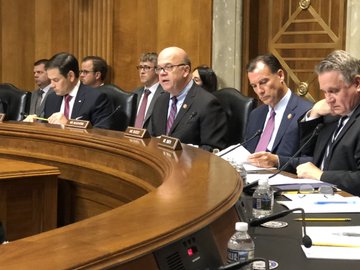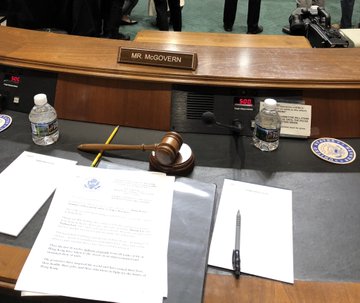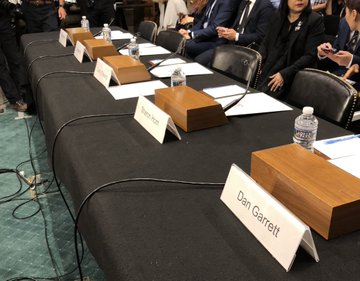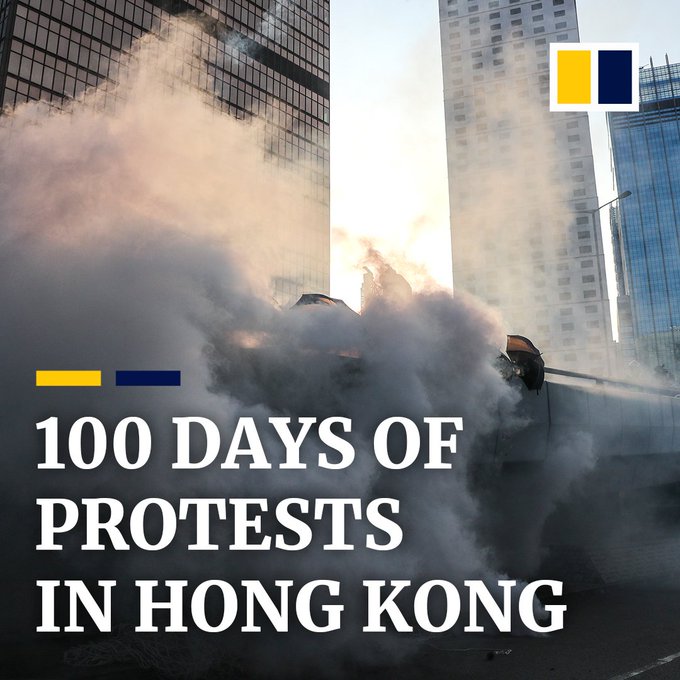WASHINGTON — House Speaker Nancy Pelosi on Wednesday welcomed Hong Kong pro-democracy activists to the U.S. Capitol, sending a message to Beijing that Congress supports the protesters in their months-long campaign for human rights.
 House Speaker Nancy Pelosi is given a lapel pin by a Hong Kong activist following a news conference on human rights in Hong Kong on Capitol Hill in Washington, Wednesday, Sept. 18, 2019. Behind Pelosi is Hong Kong activist Joshua Wong.
House Speaker Nancy Pelosi is given a lapel pin by a Hong Kong activist following a news conference on human rights in Hong Kong on Capitol Hill in Washington, Wednesday, Sept. 18, 2019. Behind Pelosi is Hong Kong activist Joshua Wong. Pelosi thanked the activists for "challenging the conscience," not only of the Chinese government, but the worldwide community with their mass protests over the territory's autonomous status.
She sided with the protesters' demand for universal suffrage and "a political system accountable to the people."
And Pelosi warned others in the U.S. government not to allow "commercial interests" to drive foreign policy in the region. House Speaker Nancy Pelosi, left, with Hong Kong activist Joshua Wong and other members of Congress during a news conference on human right in Hong Kong on Capitol Hill in Washington, Wednesday, Sept. 18, 2019.
House Speaker Nancy Pelosi, left, with Hong Kong activist Joshua Wong and other members of Congress during a news conference on human right in Hong Kong on Capitol Hill in Washington, Wednesday, Sept. 18, 2019.
"If we do not speak up because of commercial interests in support of human rights in China, we lose all moral authority to speak up for them any other place in the world," Pelosi said.
Republicans joined the Democratic leader, alongside several Hong Kong activists who have become prominent figures in the mass protests since June, in a stately room off the House floor beneath a portrait of George Washington.
Republican Rep. Michael McCaul of Texas said Americans see the young people waving American flags on the Hong Kong streets.
 House Speaker Nancy Pelosi, left, with Hong Kong activist Joshua Wong and other members of Congress during a news conference on human right in Hong Kong on Capitol Hill in Washington, Wednesday, Sept. 18, 2019.
House Speaker Nancy Pelosi, left, with Hong Kong activist Joshua Wong and other members of Congress during a news conference on human right in Hong Kong on Capitol Hill in Washington, Wednesday, Sept. 18, 2019. "If we do not speak up because of commercial interests in support of human rights in China, we lose all moral authority to speak up for them any other place in the world," Pelosi said.
Republicans joined the Democratic leader, alongside several Hong Kong activists who have become prominent figures in the mass protests since June, in a stately room off the House floor beneath a portrait of George Washington.
Republican Rep. Michael McCaul of Texas said Americans see the young people waving American flags on the Hong Kong streets.
"America stands with you," he said.
Several of the activists appeared before Congress this week, appealing to lawmakers to support the mass protests that began with a now shelved proposal to extradite people arrested in Hong Kong to China.
Against the backdrop of the 30-year anniversary of the Tiananmen Square uprising, with its brutal and bloody crackdown on young democracy protesters a generation ago, the U.S. lawmakers are prominently backing today's young activists.
Several of the activists appeared before Congress this week, appealing to lawmakers to support the mass protests that began with a now shelved proposal to extradite people arrested in Hong Kong to China.
Against the backdrop of the 30-year anniversary of the Tiananmen Square uprising, with its brutal and bloody crackdown on young democracy protesters a generation ago, the U.S. lawmakers are prominently backing today's young activists.
Hong Kong activist Joshua Wong called it "a remarkable day" to share the support of the U.S. leaders.
"We will continue our uphill battle until the day we enjoy freedom and democracy," Wong said.
Denise Ho, a singer and pro-democracy activist based in Hong Kong, thanked Pelosi for the "warm welcome" during their visit to the Capitol amid what she called a "very difficult but also very empowering" time in Hong Kong.
"This is a message to the Hong Kong people that we are not isolated in this fight," Ho said.
"We will continue our uphill battle until the day we enjoy freedom and democracy," Wong said.
Denise Ho, a singer and pro-democracy activist based in Hong Kong, thanked Pelosi for the "warm welcome" during their visit to the Capitol amid what she called a "very difficult but also very empowering" time in Hong Kong.
"This is a message to the Hong Kong people that we are not isolated in this fight," Ho said.
"We are in the forefront of this great noble fight for universal values."
During a hearing Tuesday before a U.S. government commission set up by Congress to monitor human rights in China, several activists asked lawmakers to support their efforts by banning the export of American police equipment that is used against demonstrators.
During a hearing Tuesday before a U.S. government commission set up by Congress to monitor human rights in China, several activists asked lawmakers to support their efforts by banning the export of American police equipment that is used against demonstrators.
They also want lawmakers to more closely monitor Chinese efforts to undermine civil liberties in the city.
Republicans and Democrats on the panel, the Congressional-Executive Commission on China, expressed their support.
Republicans and Democrats on the panel, the Congressional-Executive Commission on China, expressed their support.
Rep. Jim McGovern, D-Mass., said Wednesday the hearing was beamed around the world and "no doubt" watched closely by the Chinese government.
The House is expected to advance legislation that would require the secretary of State to annually review Hong Kong's special economic and trade status, providing a check on the Chinese government's influence and the territory's autonomy.
Pelosi welcomed the Hong Kong government's decision to drop the extradition bill that sparked the protests over summer, but she said Wednesday, "We all know it's not enough. Much more must be done."
The House is expected to advance legislation that would require the secretary of State to annually review Hong Kong's special economic and trade status, providing a check on the Chinese government's influence and the territory's autonomy.
Pelosi welcomed the Hong Kong government's decision to drop the extradition bill that sparked the protests over summer, but she said Wednesday, "We all know it's not enough. Much more must be done."
The speaker, who has become something of an alternative ambassador on the global stage during her tenure, has a long history of monitoring China from her early years in Congress when she appeared with other lawmakers in Tiananmen Square to pay tribute to the protesters.
Hong Kong, a former British colony, has been allowed certain autonomy and freedoms since it was returned to China in 1997 as a territory, with a "one country, two systems" policy that was supposed to ensure a smooth political transition.
Under U.S. law, the territory of Hong Kong receives special treatment in matters of trade, customs, sanctions enforcement, law enforcement cooperation and more.
Hong Kong, a former British colony, has been allowed certain autonomy and freedoms since it was returned to China in 1997 as a territory, with a "one country, two systems" policy that was supposed to ensure a smooth political transition.
Under U.S. law, the territory of Hong Kong receives special treatment in matters of trade, customs, sanctions enforcement, law enforcement cooperation and more.
China has benefited from this and used it to evade U.S. export controls and sanctions.
The legislation to be considered by the House from Rep. Christopher Smith, R-N.J., places Beijing on "annual notice" that it will lose Hong Kong's special economic and trade status if its autonomy continues to erode.
The legislation to be considered by the House from Rep. Christopher Smith, R-N.J., places Beijing on "annual notice" that it will lose Hong Kong's special economic and trade status if its autonomy continues to erode.











